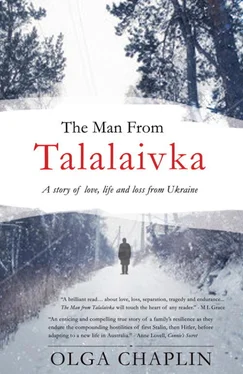She screamed to Mykola and the children. She could not run with them to the dormitory: it had even less protection than this building, which was located closer to the commandant and soldiers’ quarters, with their underground bunker beside their building. Only the soldiers were permitted to use the bunker. But the bombers were risking all, had not taken their usual course: had veered from the south-east, swooping along the narrow forested gully.
Already the fire trucks were leaving for Wilhelmshaven, anticipating the bombs and had just left, on a side escape, as a bomb blasted at their holding bay.
“Oh, Boje!” Evdokia heard herself scream as shrapnel and gunfire cracked on the old roof, singeing timber, scattering debris around her. Their men were gone, the women trapped underground.
“Kola!” she shouted. “Quickly! Take the little ones now! You and Ivor—take the children’s hands… Run! Run to the bunker! We must all hide there! Quick! Quick, Kola!” She pushed them all towards the door, pointing them to the bunker, the older infants running after Mykola and Ivor as they carried several of the weaker children.
Another blast sent window glass scattering into the room. She rushed to the corner, Nadia still in her arms, threw a pillow into the pram over baby Ola, then Nadia on top, placed another pillow over her to protect her from the flying glass and pushed the pram as fast as she could, leaning over it to protect the children, towards the concrete underground bunker. She could just make out the shapes of soldiers diving into it through its small opening, could not see the children, but prayed they had reached this safety.
“Dear God, please let them find room for us!” she pleaded, grabbed Nadia and Ola at the doorway and hurled herself into the bunker, just as a soldier was about to close its metal door. “Oh, danke, danke!” she tried to gasp for air, winded. Someone in the near-pitch dark steadied her, made room at a pew along the wall. She clutched Nadia on her lap, Ola in her arm as she tried to acclimatise her eyes to the dark to seek out Mykola and the other children. The bunker was airless; she felt suffocated. But she was grateful she and the children were not refused a place.
Someone moved close to her. At first, she thought it must be Mykola, but after a moment or two, she sensed otherwise. The boy-soldier, Karl, was trembling violently, almost convulsing, the shock of the near-fatal blast too much for his inexperienced mind. She leaned across and touched his arm, patted it, tried to reassure him, her Ukrainian words lost in meaning, yet she hoped they could in some way soothe him.
A flickering kerosene lamp in a corner revealed the pale frightened faces of Mykola and the other children. She sighed in relief as she tried to regain her composure, to hold back her tears in the dark. It was a tragic reality that her son, who also felt traumatised, at his tender age, had by now witnessed enough bombings and hardship, to somehow be able to distract himself, hold in his emotions, and to calm the younger children around him.
At last, they were given the order to leave the bunker. Evdokia waited at the opening, as each child appeared. They were all accounted for. She hugged Mykola, relieved they were safe now. She nodded respectfully to the soldiers, thanked them for the bunker. Some nodded as they passed, eyes averted from her and the group of children as they returned to the soldiers’ barracks. “I wonder… were they also thinking of their loved ones… their own wives and children… wherever they are, now?”
She followed the children back to the crèche building, then, puzzled at what one child had clung to throughout this ordeal, stooped and checked, and smiled. It was the children’s story book, with its fairytale, which had besotted the children, its happy ending locked in their innocent imagination despite all the threatening bombs.
A long way from this camp, in his deep underground Ziegenberg bunker near Frankfurt, Hitler, in a highly agitated state, was still living out his fantasy fairytale of out-manoeuvring Stalin in the east and the Allied coalition in the west; was still imagining that, despite all the crushing defeats of the Wehrmacht and Luftwaffe, as evidence to the contrary, he would bring Germany to victory. The ‘Wolf’ who had hunted the Soviet Union and western Europe had, yet again, changed his lair, from the Wolfsschanze, in east Prussia, and had reached almost his last lair: was soon to leave Ziegenberg for the Berlin Chancellery bunker, his final hiding place, from which he would not return. His false howl had had the following of a nation for a dozen years. His fairytale would soon be over. The reality for Germany and its citizens, for all the people of Europe, and beyond, involved in this human tragedy, was almost too much to comprehend, to bear.

Chapter 32
Summer 1947
With one final victorious swing, his body stretching drum-tight as if emulating the soaring trees, Peter brought down his axe with muscular precision, shattering the virgin log. Chest heaving, he stepped back, his parched lips tasting the mix of beech sap and sweat beads in confusing sensation. He pushed back his soaked hair, adjusted his dusty cap. Hryhori and Borys, paused at their unyielding log, watched their friend admiringly.
“Hah, Petro! What devil are you hunting from here?” Hryhori called out. Peter grinned and waved back, returning the jest: “Come on fellows, show your strength!” as they resumed their chopping. Like brothers, they had followed him to this forest camp after the horrors of the Wilmhelmshaven bombings and had been guided in camaraderie by their friend who, their senior in years but young in hope, had shown courage, even reckless bravery, in the fire-fighting brigades in those long months of Hitler’s war.
Peter straightened his back as he surveyed the next log, and breathed in deeply in satisfaction. There was honour to be found even in this menial shoulder-crunching work, so different from his veterinary work in his Ukraine. He knew its significance, for his family’s eventual safety. Since transportation from Wilmhelmshaven to their Heidenau camp, uncertainty for their future continued. His quick thinking had temporarily improved their chances, in hastily arranged records upon leaving their wartime camp, the illusory village of Mirohoshtcha, Polish-Ukraine, giving some protection for him and Evdokia. And the Allied Occupation Forces’ control of western Germany reduced, somewhat, the chances of being forcibly returned to Stalin’s Russia and his waiting labour camps. Every stroke of the axe he now made in this back-breaking work was a stroke for his family’s ultimate future. He regained his strength, picked up his weighty axe, began again.
Absorbed in his work, the piercing yard horn that alerted them to early Saturday finish-time startled him. Despite his exhaustion he moved swiftly towards the office grounds and the waiting transport truck, took the treacherous shortcut, carefully avoiding the ‘danger’ markers that signified unexploded Allied bombs in the muddy undergrowth. He was anxious to see his little Ola: her fretful crying through the night had given him and Evdokia little sleep. He heaved himself onto the truck, catching a glimpse of his reflection in the window of this British Timber Agency office: a dishevelled, drawn face, almost unrecognisable as the man taken from his Ukraine almost four years earlier. He blinked away, caught the commandant’s glance at the office door.
“Herr Pospile,” the commandant eyed him thoughtfully. Peter nodded, in respect. Fleetingly, conquered proud eyes met dusty hopeful eyes. The commandant stepped back into his office, his uniform spotless, now without its epaulettes, shabby, but worn with resigned dignity, belying the grubby shame he still carried for his generation of Hitler-followers. Peter brushed at the wood-dust on his face, felt the sting of a splinter lodged into the crevice of his gaunt cheek. Stung by the pain, his eyes moistened, momentarily. He felt empathy for this German commandant, now required to do his duty, not for Hitler’s Third Reich, but for the British and American Occupation Forces who controlled northwestern Germany, for reconstruction and reparations. “At least he has stayed to do his duty,” Peter told himself. “At least he found the courage to remain, rectify some of the wrongs… unlike those cowards who escaped the consequences of their murderous acts. Secret vials of potassium cyanide and silenced bullets are an easy sentence of death, when it is self-inflicted, without any show of remorse.”
Читать дальше













